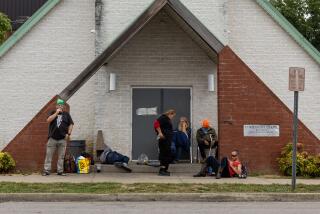Addiction specialist worked with celebrities
- Share via
Bob Timmins, an addiction specialist who is credited with salvaging the lives of a long list of celebrity drug users by steering them onto the path of sobriety and helping them stay there, died of respiratory failure Wednesday at his home in Marina del Rey. He was 61.
In recent years Timmins conducted his work while battling chronic obstructive pulmonary disease, said his friend Jeff McFarland.
Though little known by the public at large, Timmins was a titan in the world of recovery.
Some of his clients -- members of the bands Motley Crue and Aerosmith -- have spoken publicly about Timmins’ role in helping them battle drug abuse. But most preferred anonymity, a request Timmins took pride in honoring.
“Bob has helped everyone from the owners of sports franchises to heads of movie studios to Grammy-winning, internationally known music idols . . . as well as the most down and out homeless person who comes to him for help,” said Michael Nasatir, a friend and an attorney, who worked in the same office as Timmins.
Timmins, who worked with a partner, assessed and advised drug addicts and placed them in treatment. In courts across the nation he was an expert witness and a consultant in the development of treatment plans for addiction-related offenders.
Judges paid Timmins for his expertise in selecting a proper program for a defendant, “but the amount we paid him was a joke compared to what he did,” said Bernard Kamins, who served as a Los Angeles County Superior Court judge from 1985 to 2007 and worked in the drug court.
“Here’s this guy who for $150 would get somebody straightened out. . . . He knew the right places to put people, and he gave them two things: hope and motivation. As a judge I couldn’t do that,” Kamins said.
Timmins steered clients to 12-step meetings and helped them find sponsors. He was also a proponent of sober companions, people who spend their days with addicts to keep them away from drugs.
In the entertainment industry, Timmins influenced the way recording labels treat artists by requesting amenities such as “safe rooms”: spaces devoid of drugs and alcohol, said his nephew, Bryan Timmins.
“It used to be that drugs and alcohol were given freely to the artists for their creativity and for their satisfaction,” he said. “Bob was very instrumental in changing that dynamic.”
After the 1995 death of Shannon Hoon of the group Blind Melon from a drug overdose, music industry leaders organized a meeting to discuss the problem of drug abuse. “Bob was one of the ones who organized this first salvo of attention. And out of that came the MusiCares Foundation,” which provides assistance to musicians, including those suffering from addiction, said Harold Owens, senior director of the MusiCares/MAP Fund.
Working with celebrities did not leave Timmins star-struck, because “I see them as human beings first. I see them in their pain and try to help them through a suicide attempt or whatever’s going on,” he said in a 1991 article in GQ magazine.
When it came to working with rock artists, Timmins’ choice of music also shielded him.
“I’m not, like, a rocker guy,” he said. “I listen to jazz. A lot of times the first time I hear of a group is when I’m called in to meet with them.”
What Timmins knew about drug abuse, recovery and redemption was learned from experience.
Robert Wayne Timmins was born in Los Angeles on Sept. 27, 1946, the son of a police officer. His mother suffered from mental illness and, after committing acts of violence, was institutionalized, Bryan Timmins said.
By ninth grade Timmins was a dropout and a heroin addict, living on the streets. In his 20s he spent time in prison for armed robbery.
The turning point came after his release from prison. A public defender helped him make the right choice. Timmins began going to 12-step meetings, was taken under the wing of his sponsor and thrived.
In the years that followed, he helped found and was involved with several organizations, including the recovery centers Impact and Cri-HELP in Los Angeles and the National Assn. of Drug Court Professionals. Early in his career he began working with troubled youths, including a young McFarland.
“I met him when he worked at a rehab hospital in North Hollywood,” said McFarland, who is now an attorney. “I was a 19-year-old drug addict and criminal, and he helped me turn things around. He had instant credibility. When you spoke to him, you knew that he had lived the life that you live. And he understood.”
In addition to his nephew, Timmins is survived by a great-niece, Isabel, of San Diego.
A memorial service is scheduled to be held at 1 p.m. today at the Self- Realization Fellowship Temple, 17080 Sunset Blvd., Pacific Palisades. Memorial donations may be sent to the Timmins Foundation, c/o Jeff McFarland, 865 S. Figueroa St., 10th Floor, Los Angeles, CA 90017.
--


